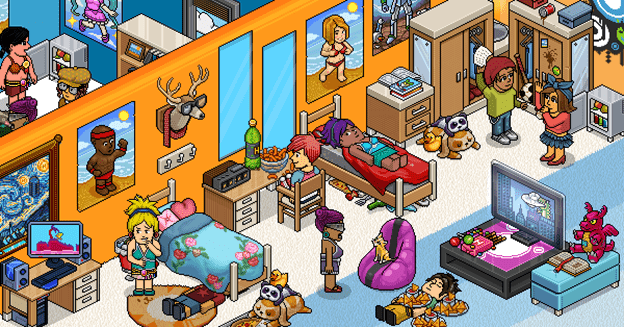
In light of the recent rebranding of Zuckerberg’s universe and the emergence of Meta, it is clear that social games are more relevant than ever. The pandemic has given a new life to all online communities/social games, from Habbo to Fortnite. Starved for communication, people have turned to online spaces. Going forward, social games will keep growing and developing into entire multiverses.
What’s a social game?
A “social game” is a bit of a vague concept. Every gamified online community can be considered a social game, but technically, so can Sims. The only requirement is for the game to be heavy on a social aspect. This implies that the main appeal of a social game is that it connects users and allows them to communicate and build relationships in a designated online space.
The pioneers of social gaming, such as Habbo Hotel (launched back in 2000), enjoy unparalleled loyalty from players. It is pretty common for social gamers to play the same game for over a decade and basically transfer their lives into the metaverse. Metaverse is defined as “a persistent bridge between the physical and digital worlds with unprecedented scale, interactivity, and interoperability.” Simply put, it is an online universe that mimics the real world in terms of what members/players can do. Social games do just that.
Why social games are popular
- They are a great way to socialize. The number one reason why social games are so popular is that they allow players to connect through space without actually leaving their couches. This is why social games, social media (which are essentially social games with less gamification), and live casinos have become so popular during the pandemic. The latter offer gamblers to play games with live dealers, and the experience is quite close to that in land-based casinos social interactions-wise.
- They offer an escape from reality. Take Habbo, which used to be Habbo Hotel. It still has millions of players that have been part of the community since Habbo Hotel’s early days. Many of them have friendships there that last longer than real-life ones. Social games allow one to build a parallel life for themselves, which is exciting.
- They are addictive. Just like social media and social slots, social games are difficult to walk away from, especially for users who have been playing for a while. In addition to offering massive opportunities for socializing, social games allow one to form a new identity via user-generated content (UGC). So it’s not really surprising that some players find it hard to remember that social games are supposed to be secondary to real-life experiences.
Social games to check out
Habbo
Habbo (formerly Habbo Hotel) is the pioneer of social games. It is an online community/game where players live as avatars in a universe that resembles arcade games. Habbo looks very retro but has a cult-like following and is definitely worth a try.
Second Life
As the name suggests, Second Life is another classic social game. Players create avatars and build an entire parallel life in the game’s universe. Second Life is not nearly as OG or popular as Habbo, but the visuals are much better and realistic-looking.
SmallWorlds
SmallWorlds is a lovely MMORPG that is conceptually similar to both Habbo and Second Life. SmallWorlds’ avatars are more cartoonish than Second Life’s, and it has fewer active users. But it has great in-game features, such as access to YouTube videos.
Fortnite
Fortnite is not exactly a social game in the traditional understanding of the concept. It’s primarily a shooter-survival game. But Fortnite is heavy on user communication and allows players to build both their identities and entire locations as they please.
Meta
Finally, Zuckerberg’s recent decision to turn Facebook and affiliated platforms into Meta requires no introduction. It has little in common with Habbo-like OG social games, but it is definitely an attempt to create a true metaverse. And it is entirely socialization-based. So Meta surely belongs on the list of social games.




